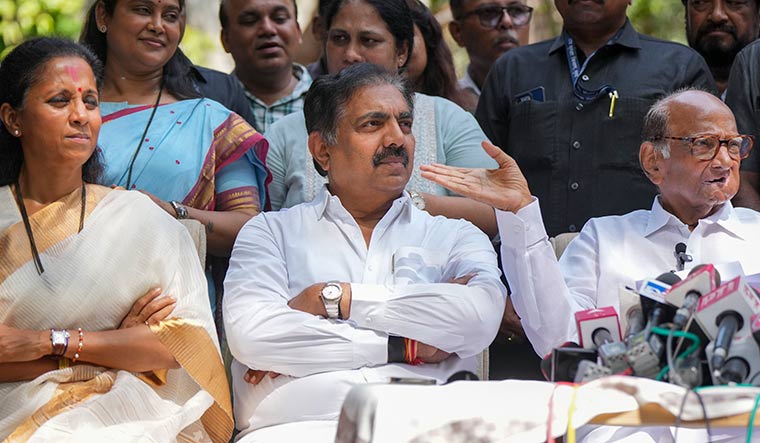The big defeat handed by voters to the BJP-led Mahayuti alliance in Maharashtra did not come as a surprise. Even though BJP leaders refused to acknowledge it, there was a strong undercurrent of anti-incumbency in the state against the Narendra Modi government.
Add to it the sympathy for Uddhav Thackeray and Sharad Pawar for the way the BJP split their parties (the Shiv Sena and the Nationalist Congress Party, respectively), robbing them of long-held party symbols and even the Election Commission’s original party status. People saw it as part of the BJP’s alleged manipulation of constitutional bodies. The icing on the cake was Rahul Gandhi’s two yatras, which saw the consolidation of traditional Congress votebanks―dalits, Muslims and tribals.
The BJP has been the biggest loser. It won only nine of 28 seats contested. Three of its Union ministers―Bharati Pawar, Raosaheb Danve and Kapil Patil―bit the dust.
Ajit Pawar’s Nationalist Congress Party, a BJP ally, contested four seats but won just one. For all his bluster, he could not secure victory for his wife, Sunetra Pawar, in Baramati. Sharad Pawar proved his hold on the constituency by ensuring daughter Supriya Sule’s victory.
Among BJP allies, it was Chief Minister Eknath Shinde’s Shiv Sena that performed relatively well. It won seven of 15 seats it had contested.
The Congress-led Maha Vikas Aghadi performed unexpectedly well. The Congress itself made a stunning comeback―from a lone seat in 2019 to 13 this time. A major reason for the revival was the successful transfer of Shiv Sena (UBT) votes to Congress candidates. In Mumbai North Central constituency, for instance, Congress candidate Varsha Gaikwad defeated high-profile lawyer and BJP candidate Ujjwal Nikam. Uddhav had assured Gaikwad that the Shiv Sainiks would send her to Parliament.
Sharad Pawar’s party won eight of 10 seats―the best strike rate among all parties in Maharashtra. Uddhav’s Shiv Sena won nine of 21 seats, including three of six seats in Mumbai. Dalits and Muslims, who traditionally support the Congress and the NCP, voted overwhelmingly for Uddhav’s candidates. Besides, contrary to what Shinde claimed, ordinary Shiv Sainiks stood firmly behind Uddhav. Most importantly, he successfully conveyed to voters that the BJP was taking businesses out of Mumbai, weakening its position as India’s financial capital.
The Mahayuti did well in Thane, Palghar and Konkan regions. Shinde’s Sena bagged Thane and Kalyan, the BJP bagged Palghar and Sindhudurg, and the NCP won Raigad. The comfortable victories of Sunil Tatkare of the NCP (Raigad) and Union minister Narayan Rane (Sindhudurg) showed that the Shiv Sainiks in this belt have sided with Shinde.
The anger of onion farmers had the BJP suffering heavy losses in north Maharashtra. The anti-BJP sentiment had become clear when Modi campaigned for Union minister Bharati Pawar in Dindori. There were shouts from the crowd demanding to know why the Union government had banned onion exports from Maharashtra while permitting exports from Gujarat. Bharati Pawar was defeated by Bhaskar Bhagare, a zilla parishad school teacher whom Sharad Pawar had fielded.
The Maratha reservation issue contributed heavily in the defeat of the Mahayuti in Marathwada and western Vidarbha. Of eight seats in Marathwada, the saffron alliance could bag only one―Aurangabad, won by Shinde’s Sena. In Jalna, the home district of Maratha agitation leader Manoj Jarange Patil, Union minister Danve was defeated because of not just the Maratha anger but also the consolidation of Muslim and dalit votes.
A reason for the defeat of Pankaja Munde of the BJP in Beed was the political rivalry between Marathas and Vanjari, the largest backward community in Beed district. In Vidarbha, Mahayuti could win only five of 10 seats. It had won nine in 2019.
In western Maharashtra, the Maha Vikas Aghadi won eight seats and the Mahayuti four. How Sharad Pawar managed to wrest Madha and Solapur from the BJP serves as a testament to his political skills. In Madha, he pulled away the powerful Mohite-Patil clan from the BJP and fielded Dhairyasheel Mohite-Patil, who did not get along well with the outgoing MP, Ranjitsinh Naik Nimbalkar. So Pawar buried his differences with the Mohite-Patil clan to make sure that his party won the seat.
Also Read
- PM Modi's challenge in third term is to reorient his image to that of a consensus builder
- Congress kept its ear and feet to the ground to script a remarkable resurgence
- How Mamata Banerjee and nephew Abhishek upped the poll game in Bengal
- BJP’s southern push comes a cropper in Tamil Nadu
- Voters have changed, and we have benefited: Suresh Gopi
- Two independents won in Baramulla and Ladakh. What that means for the region?
Similarly, in Solapur, he made sure that the Mohite-Patils and former Union home minister Sushilkumar Shinde buried their differences to secure victory for Shinde’s daughter Praniti. In Kolhapur, Pawar persuaded Shahu Chhatrapati, the head of the royal family, to contest elections as a Congress candidate. This ensured that the Aghadi could wrest one more seat from Shinde’s Sena.
But the Aghadi suffered a setback in Sangli, where its decision to field a Sena candidate forced Vishal Patil, grandson of former chief minister Vasantdada Patil, to contest as independent. People saw it as an attempt to banish Vasantdada Patil’s family from politics, and voted to elect Vishal. He defeated outgoing MP Sanjay Patil of the BJP and the Aghadi’s Chandrahar Patil. Interestingly, in the fight between the two Shiv Senas in 13 constituencies, Shinde’s Sena won seven.
On June 5, Devendra Fadnavis announced that he would step down as deputy chief minister, taking responsibility for the defeat of the Mahayuti. He said he would work for the BJP’s victory in the assembly elections due in October. Apparently, Fadnavis sees the assembly polls as a major challenge. Going by the result of the Lok Sabha polls, the Maha Vikas Aghadi is ahead in more than 150 of 288 assembly constituencies. How the Mahayuti tackles this remains to be seen.


